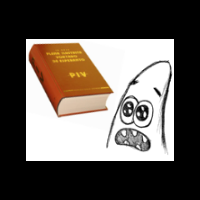メッセージ: 39
言語: English
byronarnold (プロフィールを表示) 2007年4月4日 16:55:19
Mia nomo estas Byron. Mi loĝas en la ŝtato de Indianao, en Usono.Intended translation:
Mi amas mi koroamikinon. Ŝia nomo estas Cheryl. Ŝi estas tre bela. Ŝi estas graveda. Ni ne scii se ni havos knabon aŭ knabinon. Ni esperas havi knabinon.
Mia interesoj estas religio, sciencfikcio, kaj mia belan koroamikinon. Mi estas ankaŭ lernas Esperanton!
My name is Byron. I live in the state if Indiana, in the United States.
I love my girlfriend. Her name is Cheryl. She is very beautiful. She is pregnant. We don't know if will have a boy or girl. We are hoping to have a girl.
My intersts are religion, science fiction, and my beautiful girlfriend. I am also learning Esperanto.
Thanks ahead of time for the help!!!
Mendacapote (プロフィールを表示) 2007年4月4日 17:24:41
Mia nomo estas Bajrono, mi loĝas en Indiana(o) ŝtato, Usono.
Mi amas mian belegan kaj gravedan koramikinon, Ĉerjl. Ni ankoraŭ ne scias se ni havos bebon aŭ bebinon… mi tre ŝatus bebinon!
Miaj hobioj estas religio, sciencfikcio… kaj mia belulino!
Mi ankaŭ studas Esperanton.
licx (プロフィールを表示) 2007年4月4日 17:28:38
Mia nomo estas Byron. Mi loĝas en la ŝtato de Indianao, en Usono.
Mi amas mian koramikinon. Ŝia nomo estas Cheryl. Ŝi estas tre bela. Ŝi estas graveda. Ni ne scias ĉu ni havos knabon aŭ knabinon. Ni esperas havi knabinon.
Miaj interesoj estas religio, sciencfikcio, kaj mia bela koroamikino. Mi ankaŭ lernas Esperanton!
richardhall (プロフィールを表示) 2007年4月4日 17:31:22
This might be a case of the blind leading the blind, since I'm a beginner too, but I don't think this phrase needs the -n
richardhall (プロフィールを表示) 2007年4月4日 17:36:44

I have a question of my own. Is "lernas esperanton" preferable to "studas esperanton" and why? Or why not, obviously.
byronarnold (プロフィールを表示) 2007年4月4日 17:44:05
Mendacapote:Mia nomo estas Bajrono, mi loĝas en Indiana(o) ŝtato, Usono.I wrote my paragraphs with the knowledge I'd learned so far in the course I'm using to learn Esperanto. This is much more sophisticated. However, I think I like Licx's answer better because it sticks more to what I know. Eventually, I will get to the level where the former is natural to me, and where I do understand it all. But I am not there yet...
Mi amas mian belegan kaj gravedan koramikinon, Ĉerjl. Ni ankoraŭ ne scias se ni havos bebon aŭ bebinon… mi tre ŝatus bebinon!
Miaj hobioj estas religio, sciencfikcio… kaj mia belulino!
Mi ankaŭ studas Esperanton.
licx:Mia nomo estas Byron. Mi loĝas en la ŝtato de Indianao, en Usono.
Mi amas mian koramikinon. Ŝia nomo estas Cheryl. Ŝi estas tre bela. Ŝi estas graveda. Ni ne scias ĉu ni havos knabon aŭ knabinon. Ni esperas havi knabinon.
Mia interesoj estas religio, sciencfikcio, kaj mia bela koroamikino. Mi ankaŭ lernas Esperanton!
erinja (プロフィールを表示) 2007年4月4日 18:07:26
Mendacapote:Mia nomo estas Bajrono, mi loĝas en Indiana(o) ŝtato, Usono.A note on names - you don't have to change your name if you don't want to. Esperanto names are a matter of personal preference. You can call yourself Byron or Bajron or Bajrono, or Aŭinionfdasdfo if you want to, it doesn't really matter.
With Cheryl, you could leave it as Cheryl, or if you want it to be clear to Esperanto speakers how to pronounce it, you could make it into Ŝerilo or Ŝerila (or even Ŝeril). Or (wow, getting ahead of myself here) the Esperanto female nickname suffix -nj- could make her name into "Ŝenjo" or "Ŝenja", which I think sounds kind of pretty.
Likewise, you could use the male nickname suffix -ĉj- to make your name into Baĉjo (or even "Bajĉjo", but that's harder to pronounce), a nickname form of Bajrono.
Mi amas mian belegan kaj gravedan koramikinon, Ĉerjl. Ni ankoraŭ ne scias se ni havos bebon aŭ bebinon… mi tre ŝatus bebinon!Even under strict interpretation of Esperanto genders, I believe that "bebo" is gender neutral. The word "bebo", I believe, doesn't automatically indicate a boy. I think "knabo" and "knabino" are the best choices here.
You could also go for the extra "cuteness factor" and say "knabeto" and "knabineto" (a little boy or a little girl)
awake (プロフィールを表示) 2007年4月4日 18:44:24
byronarnold: Mia nomo estas Byron. Mi loĝas en la ŝtato de Indianao, en Usono.Licx caught one that is not as obvious, so I thought I'd point it out.
Mi amas mi koroamikinon. Ŝia nomo estas Cheryl. Ŝi estas tre bela. Ŝi estas graveda. Ni ne scii se ni havos knabon aŭ knabinon. Ni esperas havi knabinon.
Mia interesoj estas religio, sciencfikcio, kaj mia belan koroamikinon. Mi estas ankaŭ lernas Esperanton!
you wrote, "Ni ne scii se ni havos knabon aŭ knabinon."
Here "se" is used incorrectly. "Se" means "if" in the sense of "provided that"
Li malsatos, se li ne manĝos. = He will be hungry if (provided that) he doesnt eat.
You should use the esperanto "question word" ĉu (which can also mean "whether")
Ni ne scias, ĉu ni havos knabon...
We don't know if (whether) we will have a boy ...

richardhall (プロフィールを表示) 2007年4月4日 20:54:04
awake:Is there a rule of thumb or something for the correct punctuation of a sentence like this one in Esperanto? The comma after scias isn't obvious. There's nothing in my copy of "Teach Yourself..." about punctuation, but there clearly are conventions. Is it just a question of reading lots of Esperanto to learn the rules, or is there a shortcut?
You should use the esperanto "question word" ĉu (which can also mean "whether")
Ni ne scias, ĉu ni havos knabon...
We don't know if (whether) we will have a boy ...
awake (プロフィールを表示) 2007年4月5日 1:58:28
certain particles (ke, se, ĉu, etc...) are set off by a comma when they introduce a clause.
Li diris, ke li ne venos. He said, that he won't come.
Li venos, se vi ĉeestos tie. He will come, if you will be present there.
-----------
Also, commas are used to set off correlative pairs. This is a construction that can be a bit awkward for native english speakers. Instead of saying "He went to the hospital when his mom got sick" you would say
Li iris al la malsanulejo tiam, kiam lia patrino malsanis.
He went to the hospital (that time), when his mother got ill.
Or (tiu/kiu pair)
Mi scias tiun, kiu ludas en la pluvo. I know that one, who is playing in the rain.
Or (tia, kia pair)
Vi ne estas tia, kia havas talenton por kuirarto
You are not that kind (of person), who has talent for cooking arts.
etc...
Mostly you'll pick up these punctuation conventions just by seeing them over and over, I wouldnt worry about them too much. It's not wrong to omit them, and eventually it will all look natural to you.
richardhall:Is there a rule of thumb or something for the correct punctuation of a sentence like this one in Esperanto? The comma after scias isn't obvious. There's nothing in my copy of "Teach Yourself..." about punctuation, but there clearly are conventions. Is it just a question of reading lots of Esperanto to learn the rules, or is there a shortcut?






